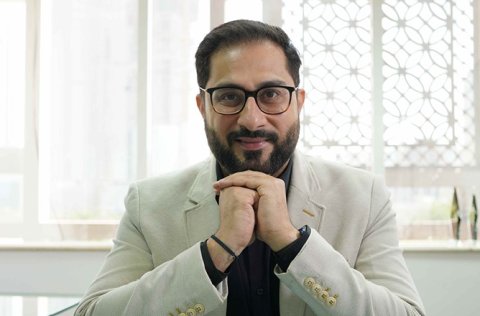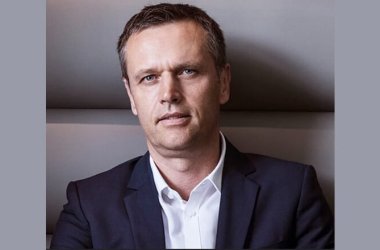CNME Editor Mark Forker spoke to Vibhu Kapoor, Regional Vice President Middle East, Africa & India at Epicor, to find out how their portfolio of solutions and services are empowering the manufacturing industry to capitalise on the opportunities that are emerging amidst the tsunami of digital transformation that is sweeping across the KSA. 
Vibhu Kapoor is undoubtedly one of the most respected IT leaders in the Middle East.
Kapoor started his career with Microsoft in 2000, and after 12 years with the US tech behemoth, he joined SAP to drive their channel business.
He continued to be one of the most prominent figures in the channel ecosystem across the MEA region in his roles with Infor and AntWorks, before his appointment as the Regional Vice President of the Middle East, Africa & India at Epicor in 2021.
For over 50 years Epicor has been a market leader in creating industry-specific software solutions that empower businesses globally, primarily in the industry verticals of manufacturing, distribution and retail.
The sheer scale and speed of the digital transformation underway in the KSA is unprecedented on a global level.
The Saudi leadership is determined to diversify its economy with its Vision 2030 program, and are attempting to reduce its economic dependence on oil to become a bastion of technological advancement and innovation.
Every major industry vertical in the KSA is undergoing rapid transformation, and inevitably there have been challenges and obstacles on the way.
The manufacturing industry hasn’t been immune to those challenges, and Epicor are leveraging their expertise to help organisations in the manufacturing sector in Saudi Arabia to adapt to the new movement that has commenced in the country.
CNME sat down with Vibhu Kapoor to find out more in terms of what the state of play is in relation to the manufacturing market in the KSA.
“The KSA represents a different opportunity, and a challenge compared to the UAE for example, which is ahead of the curve when it comes to digital maturity. When it comes to examining the manufacturing market in Saudi Arabia, it’s important to set the scene first. In 2021, the manufacturing market in Saudi Arabia was worth around US$170bn and that is being projected to reach US$210bn by 2025. This represents an increase of 22.8% which highlights the pace and scale at which the market is expanding,” said Kapoor.
Kapoor highlighted how the National Industries strategy in the KSA has been designed to increase the level of locally manufactured products and services.
“They want 60% of those services to come from the local market by the end of 2025. That’s huge and it’s a big differentiator, because manufacturing is one part, but when you say locally manufactured, it essentially means that the entire process is end-to-end. This creates a huge positive impact on the overall manufacturing ecosystem,” said Kapoor.
Kapoor also pointed out how the KSA was seeing a huge injection of foreign investment coming into the economy.
“The KSA is both attracting and retaining foreign investment, and that’s why we’re seeing such a raft of new rules and regulations coming into effect. The growth of manufacturing in the KSA is bringing more automation, digitalisation and it is also bringing new types of materials into the Kingdom for the very first time. The pace of change over the next 5-10 years will be rapid and will undoubtedly require new ways of thinking,” said Kapoor.
In terms of challenges within the manufacturing industry in the KSA, according to Kapoor the No.1 problem he and his team hear from organisations they engage with is supply chain disruption.
“We witnessed what the COVID pandemic did to the world, and Saudi Arabi, like every other country was not immune from the consequent supply chain disruption. There are also a lot of ongoing trade disputes, and we’ve seen flare-ups in relation to the Suez Canal over the last few years, and then you’ve got the ongoing situation in Europe between Russia and the Ukraine, and of course the ongoing conflict in the Middle East. These are all factors that can disrupt the supply chain. Another huge problem facing businesses has been regulatory scrutiny. At Epicor, we’re seeing that many businesses in the region are struggling to understand some of the regulations that have been put in place. The KSA government wants to do this quickly and for good reason. Industry experts must work to support the government with the guidance needed to create effective regulatory frameworks,” said Kapoor.
Kapoor said additional challenges in the KSA were related to branding and content, and quality assurance.
“The KSA marketplace can be very sensitive to certain types of branding and content. If you’re bringing global raw material products and resources then it may not culturally be the right fit, so you need to have some guidelines around branding and content. The fourth challenge is quality, and we’re increasingly seeing it, especially when it comes to manufacturing in the pharmaceutical sector. However, the views on quality can be quite divergent, so setting the right quality standards on the new type of manufacturing coming into the market is critically important. The Kingdom had a reputation for having the best global standards when it comes to oil, but as it moves away from being primarily an oil-based economy, this need to translate over to the new types of manufacturing we are now seeing,” said Kapoor.
Kapoor added that another key issue is professional and technical expertise and knowhow, but conceded that’s a common problem across different markets.
“The training and development systems need to come a long way quickly in order to meet the growing demands of the market, but you need to enable the workforce. If they are not enabled then what is the plan to enable them? These are the broad-level challenges that need to be addressed,” said Kapoor.
Kapoor say the KSA has an incredible opportunity to transition to a Green Economy.
“Saudi Arabia has their current manufacturing processes in place, but the new manufacturing setup can be from Day 1 based on a sustainable model that uses clean technology and can drive a new Green Economy. When you’re starting something from scratch you can implement green policies, so that will give KSA an edge. Part of Vision 2030 is the construction of new industrial cities, and from the onset these cities can be green. So it’s a huge opportunity that Saudi Arabia needs to grasp,” said Kapoor.
Kapoor also added that the majority of manufacturing is coming into the private sector.
“The oil industry was controlled by the government, but manufacturing primarily is in the private sector. Moving forward, the private sector will have the potential to drive innovation, job creation, and provide economic growth. The Vision 2030 agenda emphasises the importance of privatisation and economic diversification, so all of this together represents a massive opportunity for KSA,” said Kapoor.
As aforementioned in the article, the sheer scale of transformation has created an environment in which businesses in the Kingdom are impatient when it comes to executing their transformation goals, and managing their expectations is certainly a challenge.
Kapoor reinforced the importance of organisations taking the rights steps at the right time.
“There’s a passion in the KSA market to innovate at pace, but sometimes a more tempered strategy can be beneficial. One organisation should not try to boil the entire ocean at one time. Rather businesses need to take the right steps at the right time, and they’ll get there eventually. However, before we determine and understand where the organisation is at, and how they can get to the next level of maturity, we need to know what the scale and the problem statement looks like,” said Kapoor.
Kapoor highlighted the work of the Saudi Advanced Manufacturing Hub, who conducted comprehensive analysis on where the KSA manufacturing sector sits in terms of digital maturity.
“There is an entity called Saudi Advanced Manufacturing Hub and they work closely with the World Economic Forum. They have identified more than 800 investment opportunities worth US$273bn to diversify the industrial economy. It aims to increase the number of factories to 36,000 and 4,000 of those would be heavily reliant on automated equipment and technologies. The Saudi Advanced Manufacturing Hub also did the analysis and found that on the digital maturity scale of 1-10 the sector is in-between 5-6, which sounds good, but the journey from 0-5 is relevantly easy, but the jump from 5-10 is the really difficult part,” said Kapoor.
Kapoor said that Epicor always reiterates the same message to their customers regardless of industry vertical, and that is for them to take it slowly.
“At Epicor, when we talk to our customers our message to them is very clear – we tell them that they need to take baby steps, and we always tell them that technology is great, but you don’t have to run after technology and adopt it in one go. You need to understand the formula, and the formula is that technology changes exponentially, whereas organisations change organically. The gap with technology will always be there, let’s be realistic about that, but you need to get closer to it year-on-year. So, the first piece of advice we always give our customers is that if you don’t have a digital roadmap then start creating one,” said Kapoor.
Epicor has drawn acclaim from many industry analysts from its modular approach, Kapoor explained the benefits of a modular approach in manufacturing.
“Epicor Kinetic is our flagship ERP, and that’s what we provide to our customers here in Saudi Arabia. It is designed to provide flexibility and scalability to meet the diverse needs of the manufacturing sector. This approach breaks the ERP system into various modules that can be implemented in phases, or in combination based on the requirements of the manufacturing organisation. We break our ERP into different modules, and that’s the first part, secondly, even if you have implemented the entire ERP then you have something called ‘add on’ modules that come on top of your ERP system. What is important for organisations to understand is the benefit of this approach. One of the biggest benefits for businesses is the fact they can access tailored solutions to address specific needs. The second benefit is scalability, manufacturers in Saudi Arabia can easily scale their ERP system by adding new modules and this helps them with the change that is now required within the industry. You don’t need to consume everything on Day 1. As and when your business grows, the complexities increase in your business and you can add new modules, features and functionality within your ERP system to help with your diversification, growth and expansion plans,” said Kapoor.
Kapoor also added that cost effectiveness was a huge benefit that they can provide for their customers.
“Now implementing a full-blown ERP system can require a significant investment, so a modular approach enables organisations to optimise costs by investing only in modules that they need initially, and can add others, as, and when they are required. The final benefit would be related to technology adoption, and by that I don’t just mean the functionality. We have signature methodology for implementing our solutions, and this modular approach can help organisations adopt newer technologies. We also deliver the ability to be fully cloud-based. The cloud comes with its own inherent benefits of AI, personalisation and customisation and these are specific technological advancements that customers can utilise for themselves. We are empowering customers with the autonomy to drive their journey in the direction that they want, and at Epicor, we will always be on hand to guide them and give them consultancy,” said Kapoor.
The conversation then switched to the role of AI in manufacturing.
According to Kapoor, AI can be a buzzword unless you can define the use-cases.
“At the end of the day, AI is a tool and you need to understand how it is going to work for you before you adopt it. A fundamental understanding of AI is critical. With our flagship Epicor Kinetic solution, we’ve moved away from transactional based ERP to data-driven ERP. We’ve also got cognitive ERP which comes from AI and Machine Learning. As I spoke about earlier, the digital maturity of am organisation has to have a standard process, a basic process, an automated process, and smart and intelligent processes. Now, the smart and intelligent processes are enabled by AI. We’re moving from Industry 4.0 to Industry 5.0 and all these tools and processes are very important, and AI underpins all of this. It is pivotal, and it is where the human and machine collaboration will make the manufacturing process smoother than it ever was before,” said Kapoor.
Kapoor concluded that AI in a manufacturing setup ultimately minimises human error and said Epicor was leveraging it to better inform their customers.
“AI in manufacturing will yield fewer errors, while delivering greater cost efficiency, and enhanced productivity. In Saudi Arabia, when organisations construct a new factory and they procure new software technologies like ERP they will be at the helm of having AI embedded into their solutions from Day 1, as opposed to legacy organisations which are operating on legacy systems and attempting to bring AI into those systems. Our ERP is industry-led and the first version of our ERP was built 50 years ago. So over the years we have accumulated a huge intel of industry data and our AI tools are churning up that data to help our customers make the right decisions in the future,” said Kapoor.





